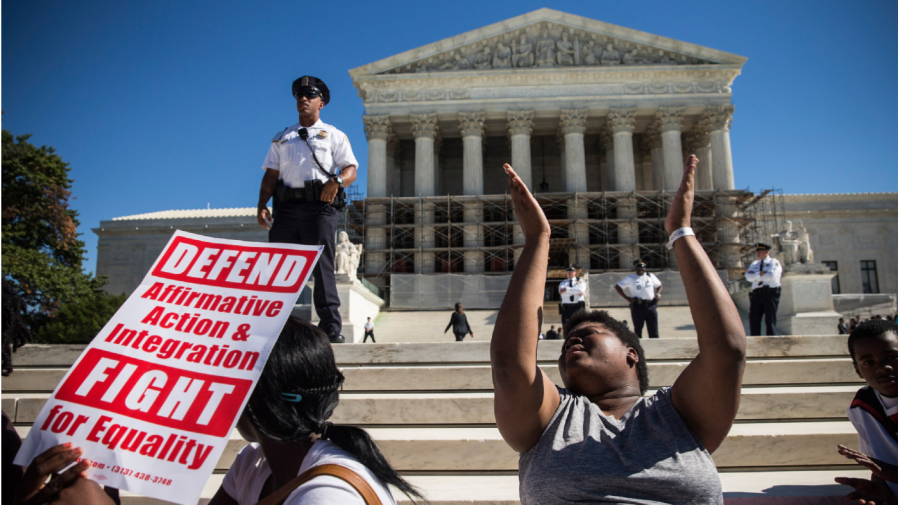The Fight To Preserve Affinity Graduations In Higher Education

Table of Contents
The Value of Affinity Graduations
Affinity graduations offer significant benefits to students and the wider university community. Their value lies in fostering a strong sense of belonging and promoting academic success for students who might otherwise feel marginalized.
Fostering a Sense of Belonging
For many students, the university experience can be isolating. Affinity graduations provide a vital sense of community and belonging, particularly for students from underrepresented groups. These ceremonies create:
- Safe spaces for sharing experiences: A dedicated space where students can openly share their experiences, challenges, and triumphs within a supportive environment.
- Strong support networks among students: These events cultivate lasting relationships and build robust support networks among students facing similar life experiences.
- Enhanced feelings of self-worth and empowerment: Celebrating shared identities and achievements boosts self-esteem and fosters a sense of empowerment among students.
- Celebration of unique cultural heritage and contributions: Affinity graduations provide a platform to showcase the unique cultural heritage and contributions of diverse student populations. This acknowledgment is vital for fostering pride and a sense of belonging.
Promoting Academic Success
Research consistently demonstrates a strong correlation between a sense of belonging and academic achievement. By fostering a supportive community, affinity graduations can significantly contribute to student success by:
- Increasing student engagement and motivation: Feeling valued and supported leads to increased participation in academic activities and greater motivation to succeed.
- Reducing feelings of isolation and alienation: A sense of community combats feelings of isolation and alienation, which can negatively impact academic performance.
- Providing role models and mentors within the community: Students can find inspiration and guidance from successful individuals within their own identity groups.
- Strengthening connections between students and faculty: These events can facilitate stronger relationships between students and faculty members who share similar backgrounds or interests.
Challenges to Affinity Graduations
Despite their significant benefits, affinity graduations face considerable challenges. Concerns about exclusivity and division, as well as legal and policy considerations, necessitate careful consideration and proactive solutions.
Concerns about Exclusivity and Division
Critics often express concerns that affinity graduations may inadvertently promote exclusivity and deepen divisions within the campus community. These concerns include:
- Potential for creating separate and unequal experiences: Some argue that separate graduation ceremonies create a sense of inequality and undermine the goal of a unified university community.
- Risk of reinforcing stereotypes and prejudices: There are concerns that these events may unintentionally reinforce harmful stereotypes or prejudices.
- Concerns about the financial burden of multiple ceremonies: The cost of multiple graduation ceremonies can place a strain on university resources.
Legal and Policy Considerations
Universities must carefully navigate complex legal and policy frameworks when considering affinity graduations. Key considerations include:
- Compliance with Title VI and other relevant legislation: Universities must ensure that all graduation ceremonies comply with federal and state laws regarding equal opportunity and non-discrimination.
- Balancing the needs of diverse student populations: Finding a balance between celebrating diverse identities and creating a unified campus experience is crucial.
- Ensuring fairness and equity in resource allocation: The allocation of resources for different graduation ceremonies must be equitable and transparent.
Strategies for Preserving and Strengthening Affinity Graduations
Through inclusive design and collaborative efforts, universities can preserve the positive aspects of affinity graduations while addressing potential concerns.
Inclusive Design and Implementation
Careful planning and inclusive design can mitigate potential negative impacts of affinity graduations:
- Open invitations and a welcoming atmosphere for all students and faculty: Emphasizing that all members of the university community are welcome to attend these celebrations fosters inclusivity.
- Emphasizing shared values and common goals: Highlighting the shared values and goals of the university community can help bridge potential divides.
- Incorporating elements of broader university traditions: Integrating elements from the main university graduation ceremony can foster a sense of unity.
Collaboration and Dialogue
Open communication and collaboration are critical to finding solutions that respect diverse perspectives:
- Fostering dialogue to address concerns and build consensus: Open and honest conversations among students, faculty, administrators, and alumni are essential.
- Creating inclusive planning committees for affinity events: Involving representatives from diverse groups in the planning process ensures inclusivity and addresses potential concerns proactively.
- Developing clear guidelines and procedures for organizing and funding events: Establishing clear guidelines and transparent procedures for organizing and funding affinity graduations promotes fairness and equity.
Conclusion
The debate surrounding affinity graduations highlights the ongoing tension between celebrating diversity and fostering unity in higher education. By carefully considering their value, addressing potential challenges, and implementing inclusive strategies, universities can preserve the positive aspects of these ceremonies while mitigating potential negative consequences. The fight to protect these important events requires ongoing dialogue, collaboration, and a commitment to creating a truly inclusive and equitable campus environment for all students. Let's continue the conversation about how to best support affinity graduations, including culturally specific graduations and other celebrations of student achievement, and ensure their continued role in fostering a sense of belonging. Join the conversation and help us protect the future of affinity graduations in higher education.

Featured Posts
-
 8 Marzo Almanacco Eventi Storici Compleanni E Proverbio
May 27, 2025
8 Marzo Almanacco Eventi Storici Compleanni E Proverbio
May 27, 2025 -
 Blake Lively Justin Baldoni And Taylor Swift Selena Gomezs Allegations And Their Impact
May 27, 2025
Blake Lively Justin Baldoni And Taylor Swift Selena Gomezs Allegations And Their Impact
May 27, 2025 -
 Trafic De Drogue A Saint Ouen Les Parents Reclament Le Demenagement De L Ecole Maternelle
May 27, 2025
Trafic De Drogue A Saint Ouen Les Parents Reclament Le Demenagement De L Ecole Maternelle
May 27, 2025 -
 Nora Fatehi And Jason Derulos Snake Conquers Uk British Asian Music Charts
May 27, 2025
Nora Fatehi And Jason Derulos Snake Conquers Uk British Asian Music Charts
May 27, 2025 -
 Ray J Explains Why Hes Never Been On Kai Cenats Stream 1035 The Beat Exclusive
May 27, 2025
Ray J Explains Why Hes Never Been On Kai Cenats Stream 1035 The Beat Exclusive
May 27, 2025
Latest Posts
-
 Bernard Kerik Remembering His Legacy As Nyc Police Commissioner
May 31, 2025
Bernard Kerik Remembering His Legacy As Nyc Police Commissioner
May 31, 2025 -
 Bernard Kerik Key Figure In 9 11 Response Dies At Age 69
May 31, 2025
Bernard Kerik Key Figure In 9 11 Response Dies At Age 69
May 31, 2025 -
 Death Of Bernard Kerik Remembering The 9 11 Nypd Commissioner
May 31, 2025
Death Of Bernard Kerik Remembering The 9 11 Nypd Commissioner
May 31, 2025 -
 Former Nyc Police Commissioner Bernard Kerik Passes Away At 69
May 31, 2025
Former Nyc Police Commissioner Bernard Kerik Passes Away At 69
May 31, 2025 -
 Unattributed Banksy A Paintings Provenance And Upcoming Auction
May 31, 2025
Unattributed Banksy A Paintings Provenance And Upcoming Auction
May 31, 2025
